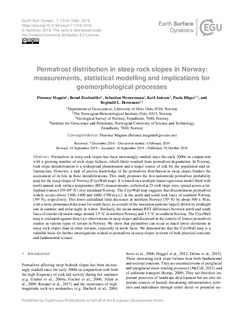Permafrost distribution in steep rock slopes in Norway: measurements, statistical modelling and implications for geomorphological processes
Magnin, Florence; Etzelmüller, Bernd; Westermann, Sebastian; Isaksen, Ketil; Hilger, Paula; Hermanns, Reginald
Journal article, Peer reviewed
Published version

Åpne
Permanent lenke
http://hdl.handle.net/11250/2630960Utgivelsesdato
2019Metadata
Vis full innførselSamlinger
Sammendrag
Permafrost in steep rock slopes has been increasingly studied since the early 2000s in conjunction with a growing number of rock slope failures, which likely resulted from permafrost degradation. In Norway, rock slope destabilization is a widespread phenomenon and a major source of risk for the population and infrastructure. However, a lack of precise knowledge of the permafrost distribution in steep slopes hinders the assessment of its role in these destabilizations. This study proposes the first nationwide permafrost probability map for the steep slopes of Norway (CryoWall map). It is based on a multiple linear regression model fitted with multi-annual rock surface temperature (RST) measurements, collected at 25 rock slope sites, spread across a latitudinal transect (59–69∘ N) over mainland Norway. The CryoWall map suggests that discontinuous permafrost widely occurs above 1300–1400 and 1600–1700 m a.s.l. in the north and south rock faces of southern Norway (59∘ N), respectively. This lower altitudinal limit decreases in northern Norway (70∘ N) by about 500±50 m, with a more pronounced decrease for south faces, as a result of the insolation patterns largely driven by midnight sun in summer and polar night in winter. Similarly, the mean annual RST differences between north and south faces of similar elevation range around 1.5 ∘C in northern Norway and 3.5 ∘C in southern Norway. The CryoWall map is evaluated against direct ice observations in steep slopes and discussed in the context of former permafrost studies in various types of terrain in Norway. We show that permafrost can occur at much lower elevations in steep rock slopes than in other terrains, especially in north faces. We demonstrate that the CryoWall map is a valuable basis for further investigations related to permafrost in steep slopes in terms of both practical concerns and fundamental science.
